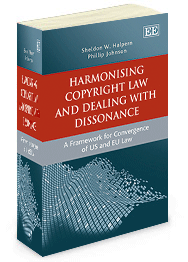According to the web-blurb:
This insightful study explores the constitutional, institutional, and cultural barriers to harmonisation of the copyright laws of the United States and the European Union [this structural-cultural approach makes a refreshing change from the studies focused on the effects of unharmonised substantive copyright law and the commercial issues surrounding their resolution: this blogger may have missed something, but he doesn't see a large and pre-existing literature on this topic]. It considers these matters in the real world transnational environment in which copyright law operates and suggests that the reality transcends the differences, offering a framework for meaningful harmonisation.The must-read bit of this book is Chapter 5, which sketches out the framework for harmonisation and concludes that the obstacles to harmonisation, despite appearances, are more theoretical than real -- and can therefore be overcome.
The authors examine in detail and offer a critique of the sporadic and historic attempts at one or another form of harmonisation, via treaty and otherwise, from the creation of a minimal standards regime to the proliferation of substantive treaties. They similarly examine the respective competencies of the US and the EU to adopt a transnational regime, and propose a workable framework consistent with these competencies.
Offering a critical analysis of treaties and other prior attempts at forms of harmonization, this book will have special appeal to governmental and nongovernmental individuals involved in the ongoing efforts of WIPO and the WTO, as well as copyright and intellectual property practitioners with internationally oriented practices.
Bibliographical data: publication date December 2014. x + 195 pages. Hardback ISBN 978 1 78254 418 0, ebook ISBN 978 1 78254 419 7. Price US$110 (online from the publisher, US$99). Web page here.






.jpg)





















